A New Generation Of Mastery-Based Learning Platforms Has Arrived (*Updated)
The $330 billion corporate training market is enormous, fragmented, and complex. For years it was dominated by Learning Management Systems (LMS) and content providers, each pioneered in the early 2000s. These systems served well, but the needs of employees and organizations moved ahead.
Today companies want not only a place to find and administer learning, they want a “Learning Platform” that creates mastery. And this market, that of “Learning Delivery Platforms,” is far more complex than you think. Let me put it straight: video-based chapter by chapter courses don’t teach you much. Companies want a solution that is expert-led, engaging, includes assignments and coaching, and connects employees to experts and peers.
Well there’s a new breed of platforms focused in this area, and I call them Capability Academy systems. They are designed to build skills-based capability academies; they group large audiences into small cohorts; and they integrate with content with live events, assignments, collaboration, mentors, and experts. And they can deliver all this at scale.
Our own Academy, the Josh Bersin Academy, is a great example of this solution. We offer dozens of 4-6 hour courses (each consumed in cohorts), we host thousands of supporting videos and articles, we have more than 30 Senior Faculty, and our social community is a “place” to learn. We offer custom journeys, a capability assessment (Global HR Capability Project), and a social network to learn and meet people. Our experience shows that the average Academy member meets 7 new people during each program.
We know that most of you want to build digital academies, management academies, safety academies, and often marketing or product management academies. Each of these is a “place to learn” that must integrate many activities. And each has a business sponsor, specific set of business goals, and often an enormous ROI.
This is the next big step in corporate learning. While self-study video-based learning has been transformational, now organizations wants more. And in these Academy platforms, every learner can be a Creator, unleashing the power of subject matter experts and innovators at scale.
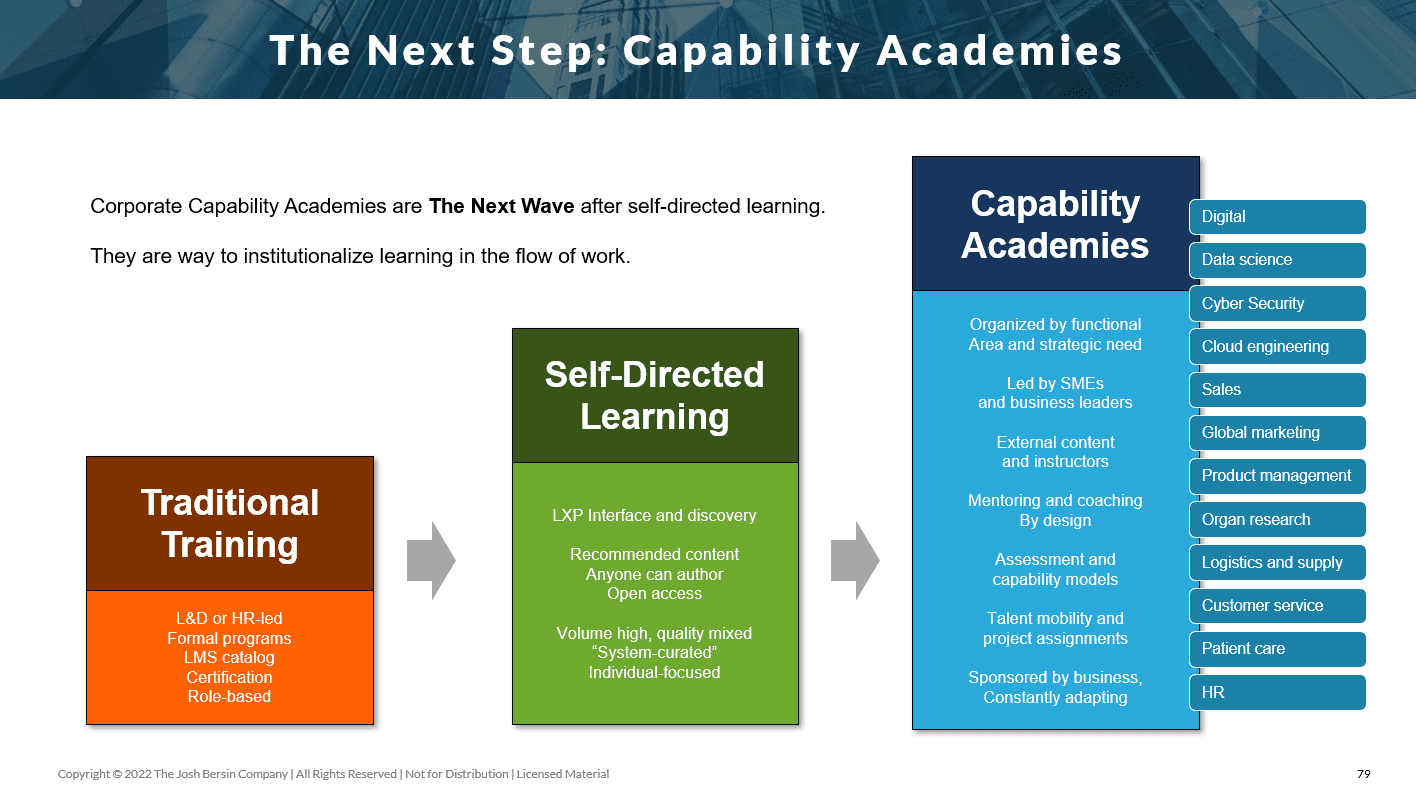 |
These systems go well beyond the traditional LMS. Consider platforms like 360Learning, Udemy, Sana Labs, Intrepid, NovoEd, or Fuse Universal: they enable experts to build, publish, and support their peers. They’re a long long way from the traditional LMS that was managed by an administrator like a mainframe system.
The new breed I discuss here includes vendors like Hone, Modal, CoRise, GrowthSpace, Nomadic, Sana Labs, Guidin, Degreed, and Teamraderie. These are platforms explicitly to bring together expert teachers, AI-enabled collaboration, assignments, and coaching to drive mastery. They can train thousands of people in small cohorts, offering hands-on support for technical or PowerSkills topics. And the results are striking: these vendors achieve 90% completion rates and netPromoter scores above 60 (far above traditional content libraries).
Let me add, by the way, that there are dozens of other vendors. So if your favorite system is not listed, please contact me and we’ll talk with the vendor directly.
Where Do Capability Academies Fit?
While some of these vendors refer to themselves as LMS platforms, that’s not really what they do. As the chart below points out, we’ve moved from Learning Management Systems (administration) to Learning Experience Platforms (content search and discovery) to Skills-based Systems. Each of these big steps made learning systems more user-focused, relevant, and personalized. Today platform vendors are going further. They’re focused on what I call learning delivery – creating a feature-filled learning experience that drives mastery, confidence, and credentials.
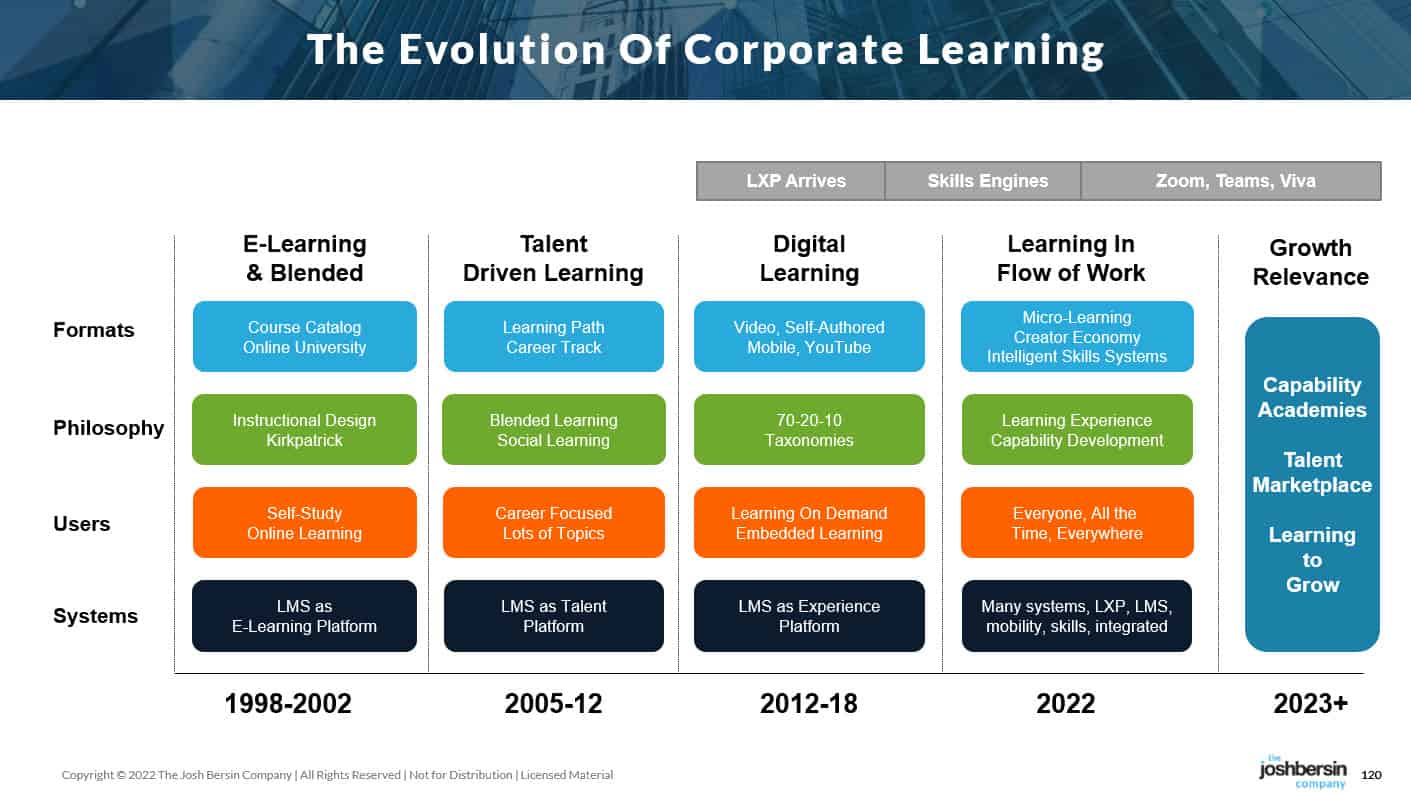 |
And this is where the market is headed. Our new research on L&D, Growth in the Flow of Work, found that high-performing L&D teams are not focused on “program quality” or “user adoption.” They focus is on growth.
Are employees advancing their skills and is it helping them to grow in their career? We don’t only learn to get better at our job: we want people to advance their skills so they can do more, take a new position, or move into management.
Let’s look at these new cohort-based, scalable, mastery platforms. (To get our in-depth report on L&D Platforms click here.)
CoRise is a fascinating company started by Julia Stiglitz, Sourabh Bajaj and Jacob Samuelson. Julia was one of the early employees at Coursera so she experienced the limitations of the MOOC model. This team has built an entire mastery based learning experience, taught by world leaders in important topics like data science, machine learning, and AI.
While the company believes in expert-led experiences, the platform is designed for scale. Students take assignments, they interact with teaching assistants, and they can work together on teams. The platform includes some unique features like “nudging” to help keep students on track, letting hundreds to thousands of people enroll in a single class. This lets CoRise keep cost per course down, unlike more expensive bootcamp programs.
The company actively markets its “experts,” along with their credentials and experience. So you as a learner (or organization) can be assured that through these courses, exercises, and online experiences you will develop real mastery. The focus is on what the company calls “live, cohort-based technical training from top experts.”
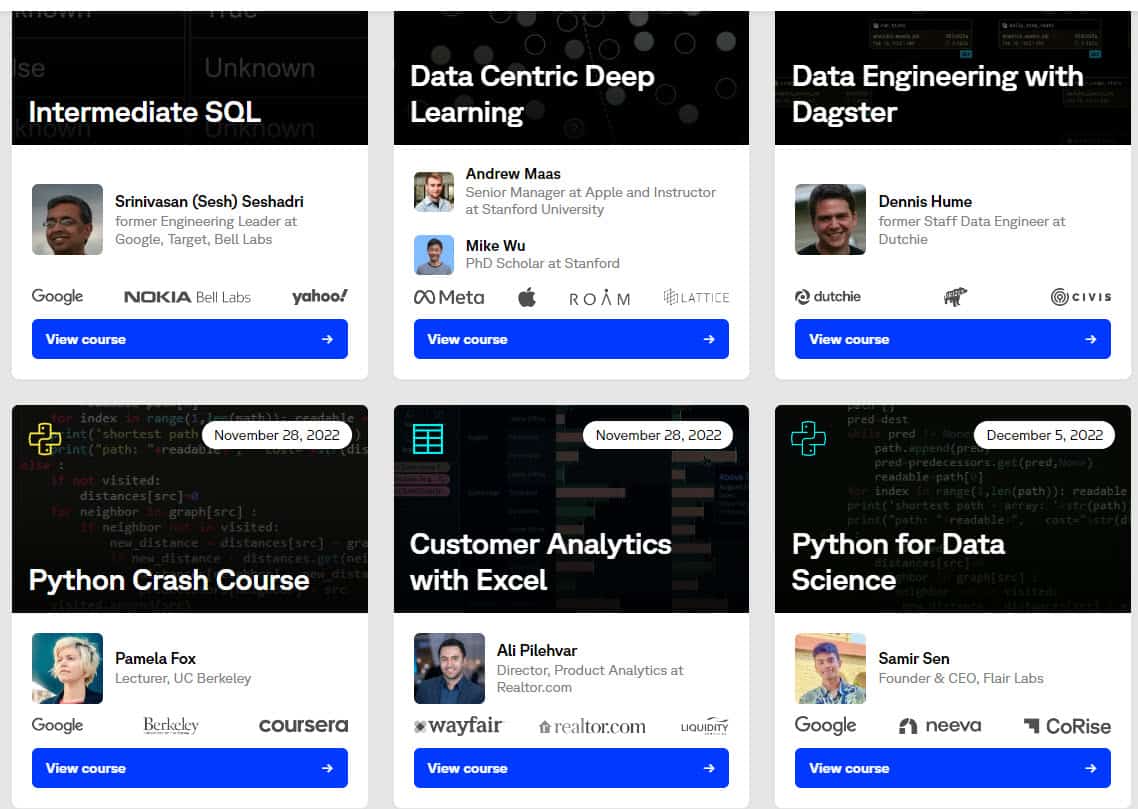 |
As the head of Tech Training at Expedia put it, “CoRise had the best results with our employees of any learning platform that I have ever used. Technical training has become a business imperative and with that I need solutions that drive real outcomes.”
The second groundbreaking mastery platform is Modal, founded by two of the early executives at Udemy, Dennis Yang (ex-CEO) and Darren Shimkus (ex President of Udemy). Darren and Dennis lived the world of mastery programs at Udemy, when the company added labs and exercises to its creator platform. So they, like CoRise, see the demand and wanted to build a better solution.
Modal is focused on deep skills development for the corporate buyer. The company’s programs bring together off the shelf programs, exercises, resources, and simulations to create eight-week journeys that drive technical mastery. Modal’s customers can use their own subject-matter experts and their internal or existing courseware to assemble these programs. Our discussions with Modal customers show very high levels of impact.
And since technical training must vary by company and individual, Modal has broken its data engineering courses into detailed skills area. This lets a CLO or training buyer select the precise skills development they need for their organization. Consider a large retailer that may want exercises on consumer goods analysis, or a technology company that wants to build AI expertise in understanding its customers’ data. I call these Capability Academies, and this is exactly what Modal has set out to do.
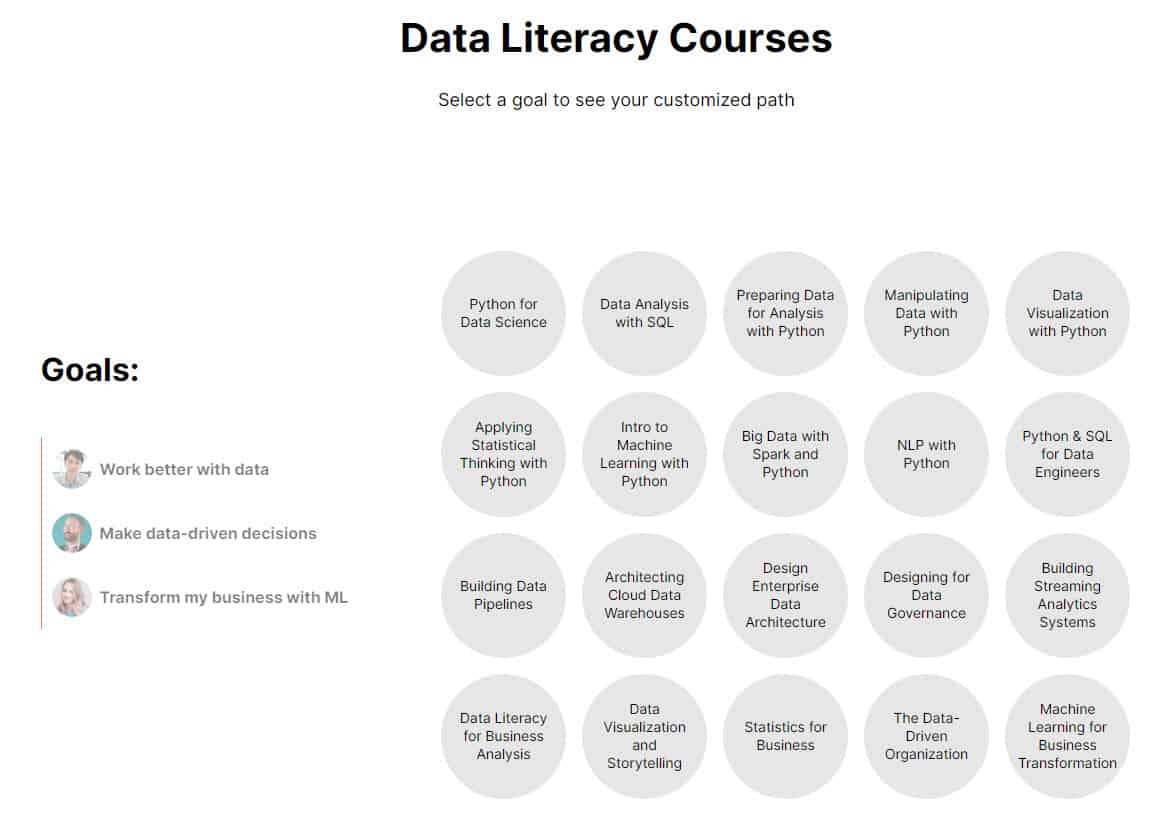 |
As I talked with Darren about the model, he reinforced that Modal (similar to CoRise) is laser focused on real learning. Every course is cohort based, it includes projects and assignments, and each student has both a coach and a set of live experiences with other students and subject matter experts.
I talked with some of Modal’s customers and they say things like “this is the way we’d want to deliver all our courses, we just never had a platform to do it.” As with CoRise, Modal has unlocked the key to mastery-based training, initially focused on data, machine learning, and technical topics.
Hone is the scalable Live Learning solution for the modern day, focused on PowerSkills (management, leadership, diversity, teamwork, etc.) and leadership development. As we all know, live classes with inspiring instructors deliver the most memorable learning in the world. All universities, executive education programs, and senior leadership programs are delivered this way. But how can we do this at scale?
Tom Griffiths, a software entrepreneur who aspired for better training in his last company, decided to build a business to solve this problem. Hone is both a world-class live learning environment (designed to schedule and assign cohorts, schedule instructors, manage breakouts rooms, manage collaboration) and a series of hard-hitting, highly effective courses in management, leadership, and all sorts of other PowerSkills.
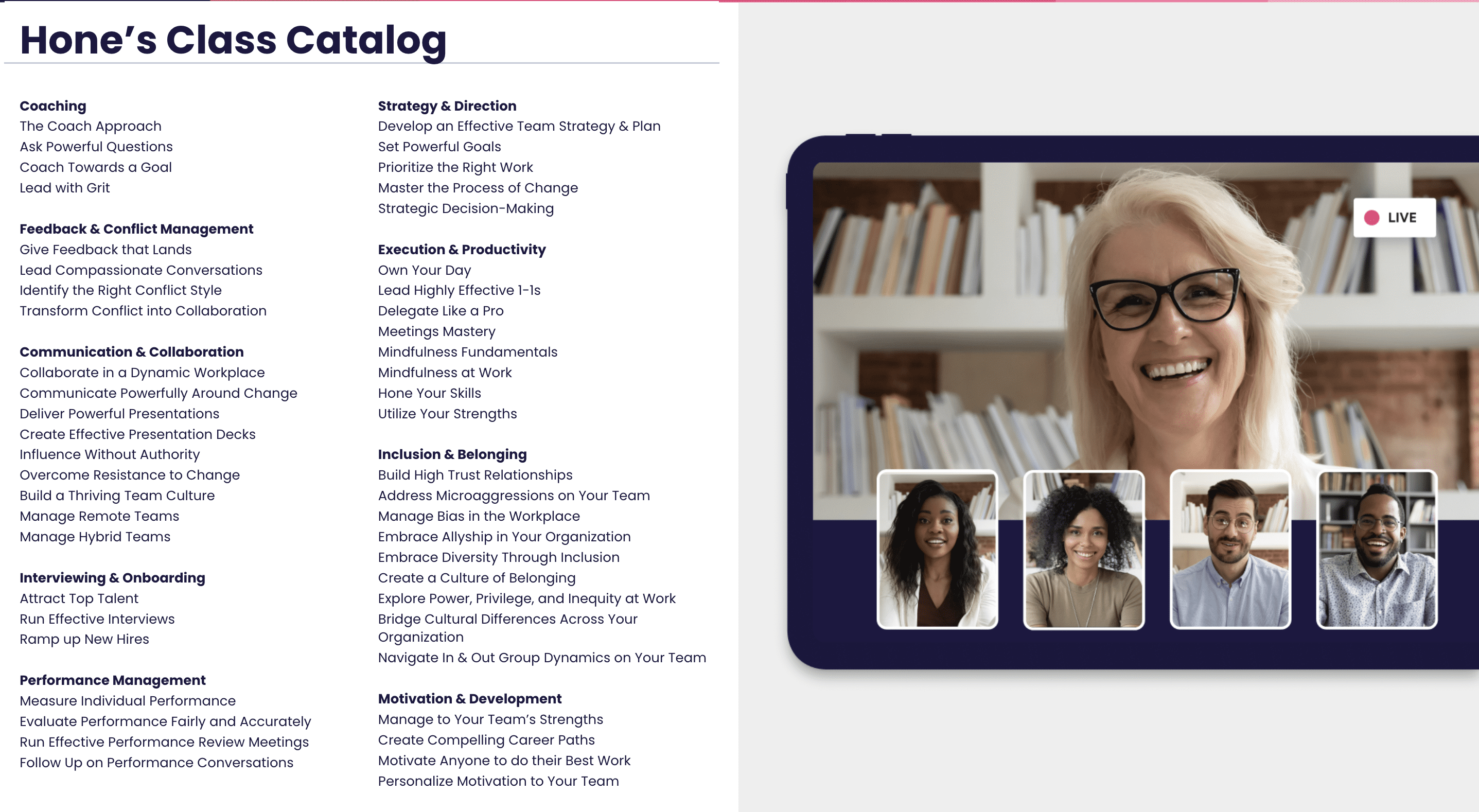 |
We just finished interviewing a series of Hone customers and they are thrilled. Similar to Modal, companies tell us things like “I never knew we could deliver live courses in such a meaningful and scalable way.” And companies can use Hone classes to build an end-to-end leadership program.
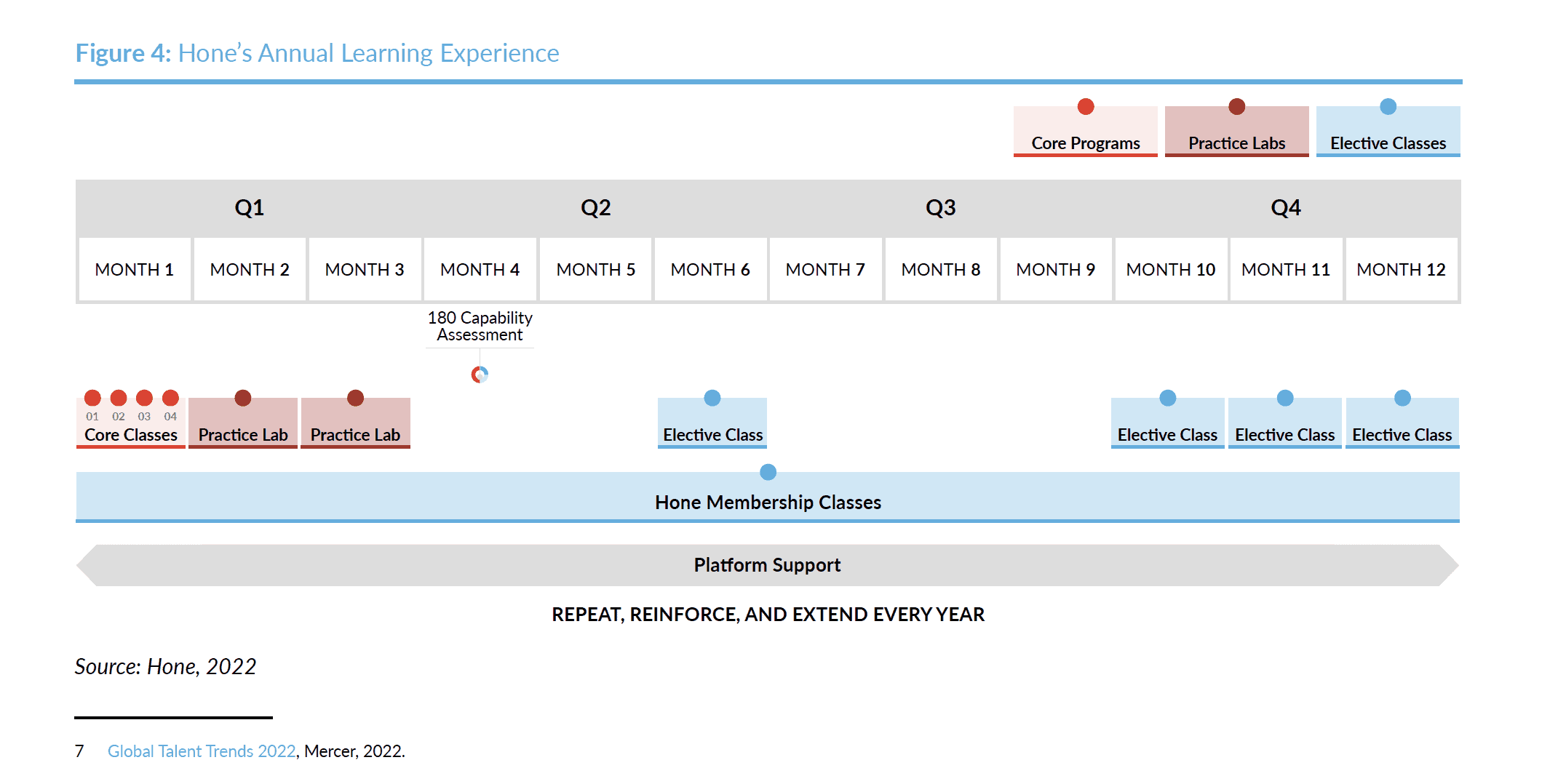 |
Let’s face it, live training classes add enormous value. As Modal and CoRise have seen in technical education, there is no substitute for a fantastic teacher, facilitator, or expert when you want to learn. Since Hone’s programs focus on leadership and management topics, their live model has a huge return – and the platform can scale. If you have 1000 managers, for example, Hone will break them down into small cohorts and automatically manage all the scheduling, feedback, and end of course administration and review. They also have exceptionally high netpromoter scores.
In a model similar to Hone, Section4 delivers business-focused management and leadership training to mid-level leaders. This means it competes with leadership vendors like CorpU (part of Udemy), FranklinCovey, SkillSoft, and other packaged providers. What’s different about Section4 is its expert-led model and the fact that programs are live, case-study based, and very business focused.
Section4 was founded by NYU Stern professor Scott Galloway, who wanted to deliver a high-quality MBA education in a live, virtual format to thousands of students and companies for a fraction of the cost of traditional offerings. Galloway is a fascinating person, with many forward-thinking ideas and perspectives on all areas of business.
Here’s how it works: members (you join the whole academy, like the Josh Bersin Academy) are grouped into cohorts, and teams take week-long courses in workshops, sprints, and certificate programs. Each course includes live sessions with an instructor, hands-on practice, brainstorming and collaboration with others, and a project to apply the learnings.
Courses are taught by business leaders who work at tech companies, investment companies, and Galloway himself. The company claims to have a 70% completion rate (seems high) a 70 NPS (very high) and they claim that 88% of students complete their projects. Teaching Assistants provide feedback on the projects.
As one client stated, “The learning model Section4 deployed has allowed us to scale around the world. It’s spread like wildfire, and people are super excited, from the top to the bottom of the organization.” – John Moloney, formerly Bose. “Section4 has been a cornerstone of our high-performer program. The breadth of learning works whether you’re doubling down on your specialty or growing into a completely new area.” – Scott Ramsay, Publicis
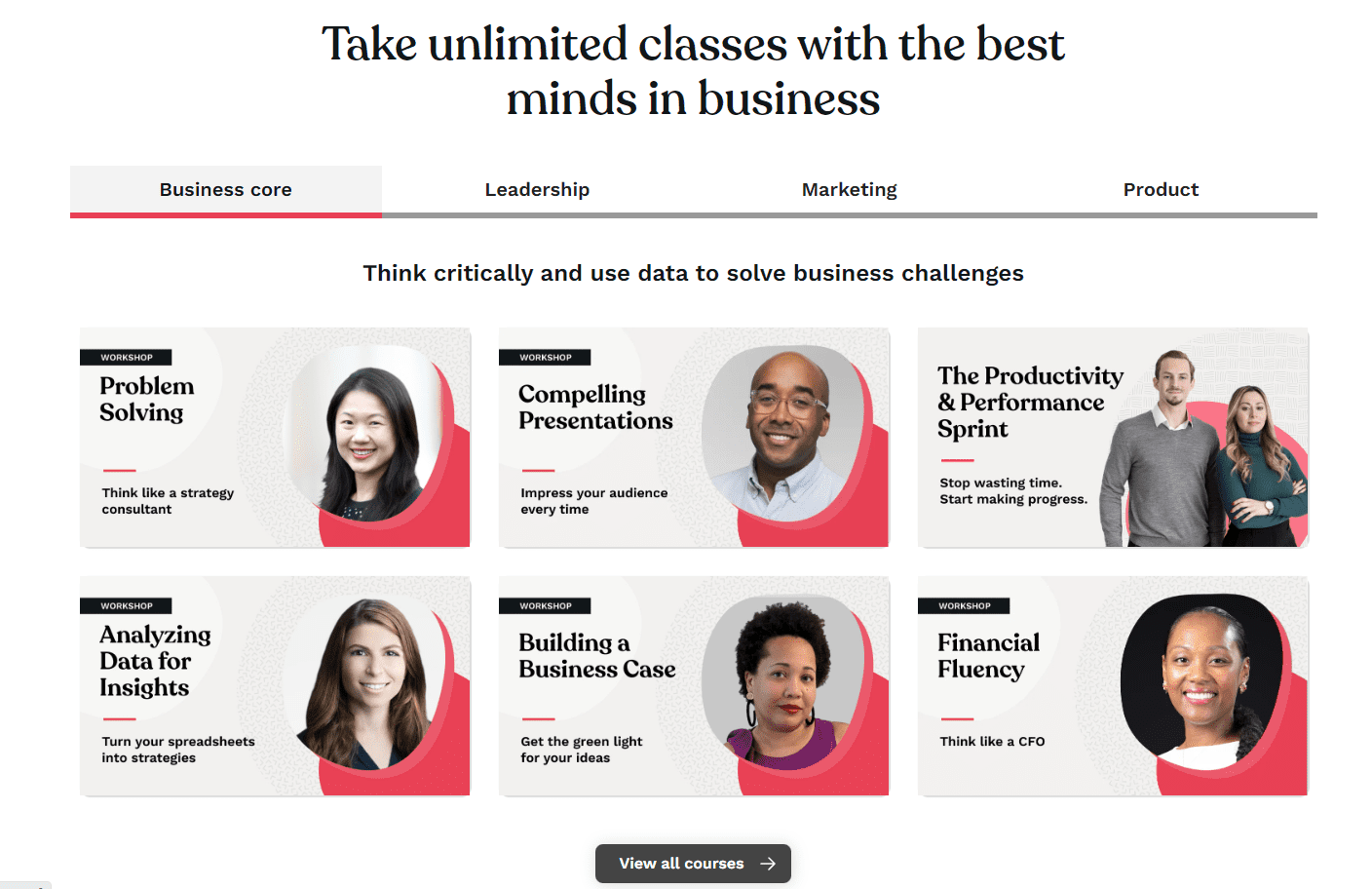 |
The company is still small and growing, and has a somewhat eclectic set of courses in leadership, marketing, product management, and core business. Now that the company is off and running, the team is working on certificate programs and more custom corporate offerings as well.
GrowthSpace is a fast-growing company focused on building a “growth platform” for individuals and teams. By bringing subject matter experts together with individuals and teams, the company delivers a very unique blended learning solution that feels like the “next-generation” blended learning or Capability Academy experience. HR/L&D teams can create customized development plans and programs by choosing from a variety of skills, program types, roles, and industries, and tailor them for the desired number of participants and duration.
GrowthSpace was founded in 2018 by Dan Terner, Izhak Kedar and Omer Glass. A former management consultant, Glass was approached several years ago by Terner, who was then the COO of Signals Analytics, a company with a significant churn problem. In a mission similar to Tom Griffiths, Omer decided he could not find an effective, outcome-driven employee development platform that focused on learning, not administration.
Designed for corporate buyers, programs include workshops (soft skills) / training (functional/technical skills) / group coaching (cohort based coaching sessions) / 1:1 coaching sessions / 1:1 mentoring sessions. Each program or development plan is focused on a predetermined development objective, and sessions are designed as short sprints focused on achieving the objective.
How does it work? Buyers “decide the scope of the program, select the relevant outcomes (KPIs) they want to achieve, and Growthspace helps match experts and design to the need.”
The platform matches each individual or group with coaches / trainers / mentors / facilitators based on the selected skills, program type, industry, function, and role. Most organizations use it for development planning, and benefit from GrowthSpace’s flexible credit economy—companies can buy credits and distribute them across individuals and groups depending on their specific development objectives and across various types of development experiences.
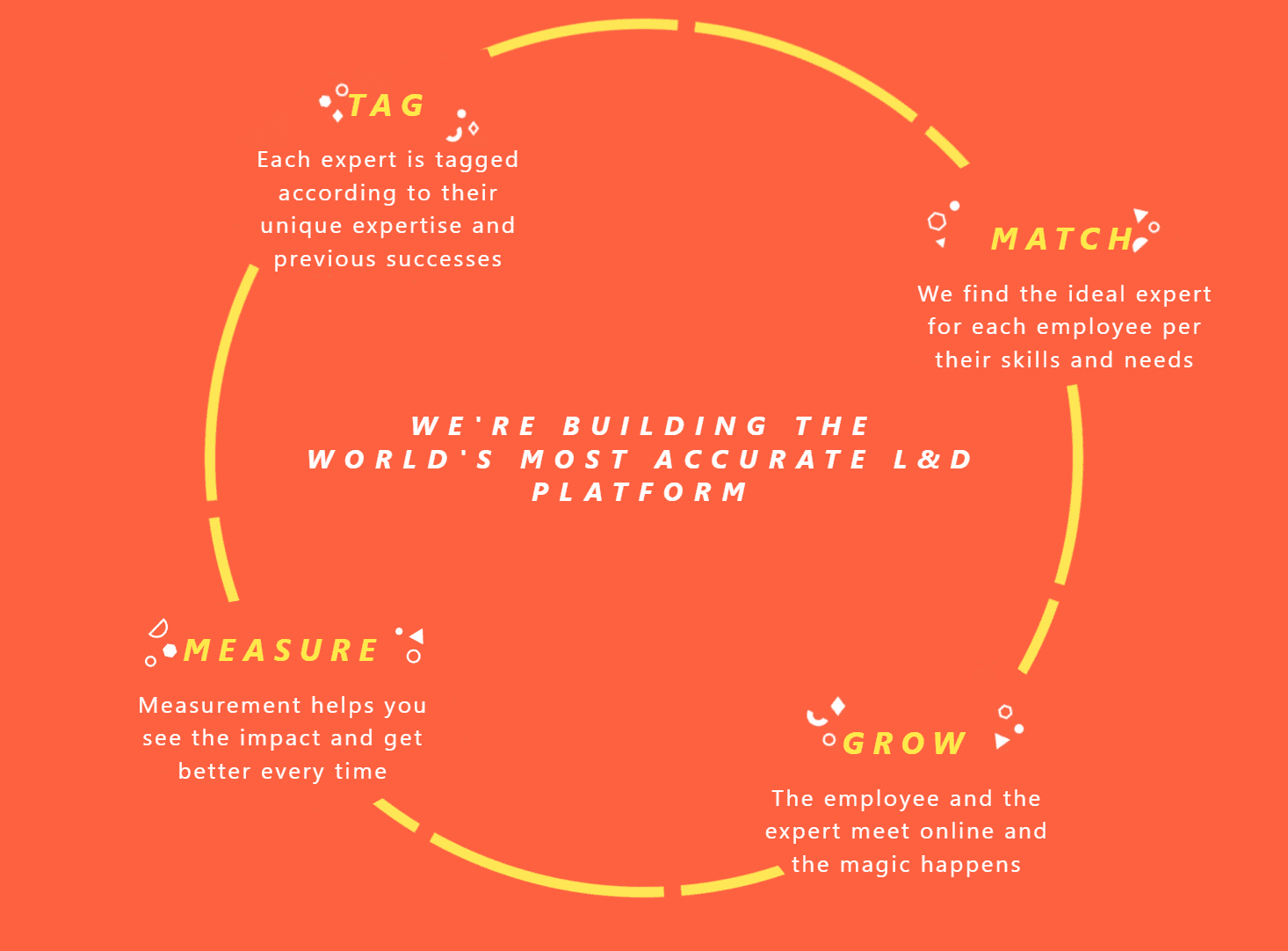 |
GrowthSpace also delivers a marketplace of experts — providers of mentoring, coaching, training and workshops. Drawing on a taxonomy of professional backgrounds and skills, which includes tags across expertise areas, industries and roles, the platform’s AI model attempts to predict the right programs and coach-student matches with the highest probability of achieving desired development outcomes.
The company now has thousands of users across 250 paying customers, including a U.S. government agency, Microsoft, Siemens, EY and Johnson & Johnson.
Nomadic Learning, the company we partner with for The Josh Bersin Academy, is a Capability Academy platform designed to be a destination location for large complex topics. When I first discovered Nomadic the company’s clients included Citibank, IBM, and other big companies using the system for large change programs, massive new sales enablement solutions, and other large “capability development” needs.
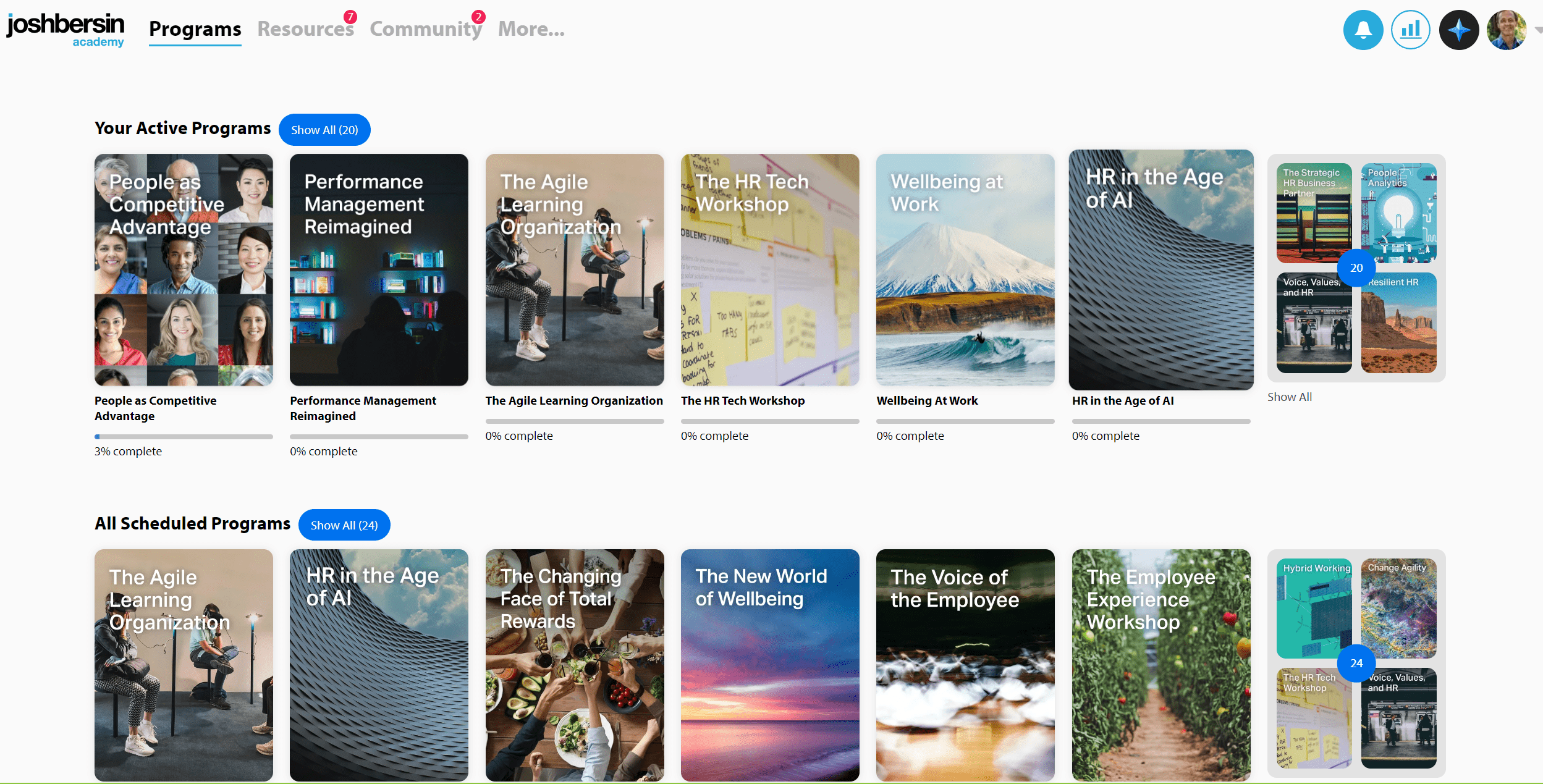 |
Nomadic is a “semi-synchronous” platform – people go through courses in cohorts and they traverse on their own, collaborating with their peers or SMEs through the content. For our rich range of content (we now have more than 25 complete curriculum and many hundreds of learning assets) this means there is “always something to learn” and “always a new course available for registration.”
Many of Nomadic’s features are designed for the company’s unique video journalism. Our courses, for example, include hundreds of stories, case studies, and lessons from the world’s leading HR leaders, our faculty, and our analysts. And we have had more than 60,000 learners complete programs, so the platform is very scalable and configurable. (Join the JBA to see it in action!)
Degreed: LearnIn Comes To Market
Let me mention Degreed, the leaders in the Learning Experience Platform (LXP) market. David Blake, the founder and CEO, completely understands this new market for Mastery Academies and has now acquired his prior company LearnIn to focus in this area. And as I’ll explain in a follow-on article soon, I think they can really execute in this area. (It’s a bit scary for all these vendors because Degreed is already so successful.)
LearnIn (it may be renamed) is modeled very much after my early descriptions of Capability Academies at scale. It brings together elements of practice, collaboration, scheduling, and purchasing (for external resources). It includes a program builder, cohort management, live session management, AI-based nudging, and integrated program-centric collaboration. And now that it has been acquired (closed in December), Degreed is really focused in this area.
 |
I know already more than ten Degreed clients who are using Learn In to build technical academies, sales academies, consultant academies, and product management academies. These clients include Citibank, CapGemini, Bell Canada, Tata Communications, Salesforce, and Prosus.
David shared with me that some of the CLOs he’s talking with are spending as much as 50% or more of their L&D budget on Capability Academies (or Mastery Academies) today. Off-the-shelf content warrants no more than 10-15% of their budget (LinkedIn Learning, Skillsoft, etc.) while the true mastery experiences warrant 3-4 times the investment.
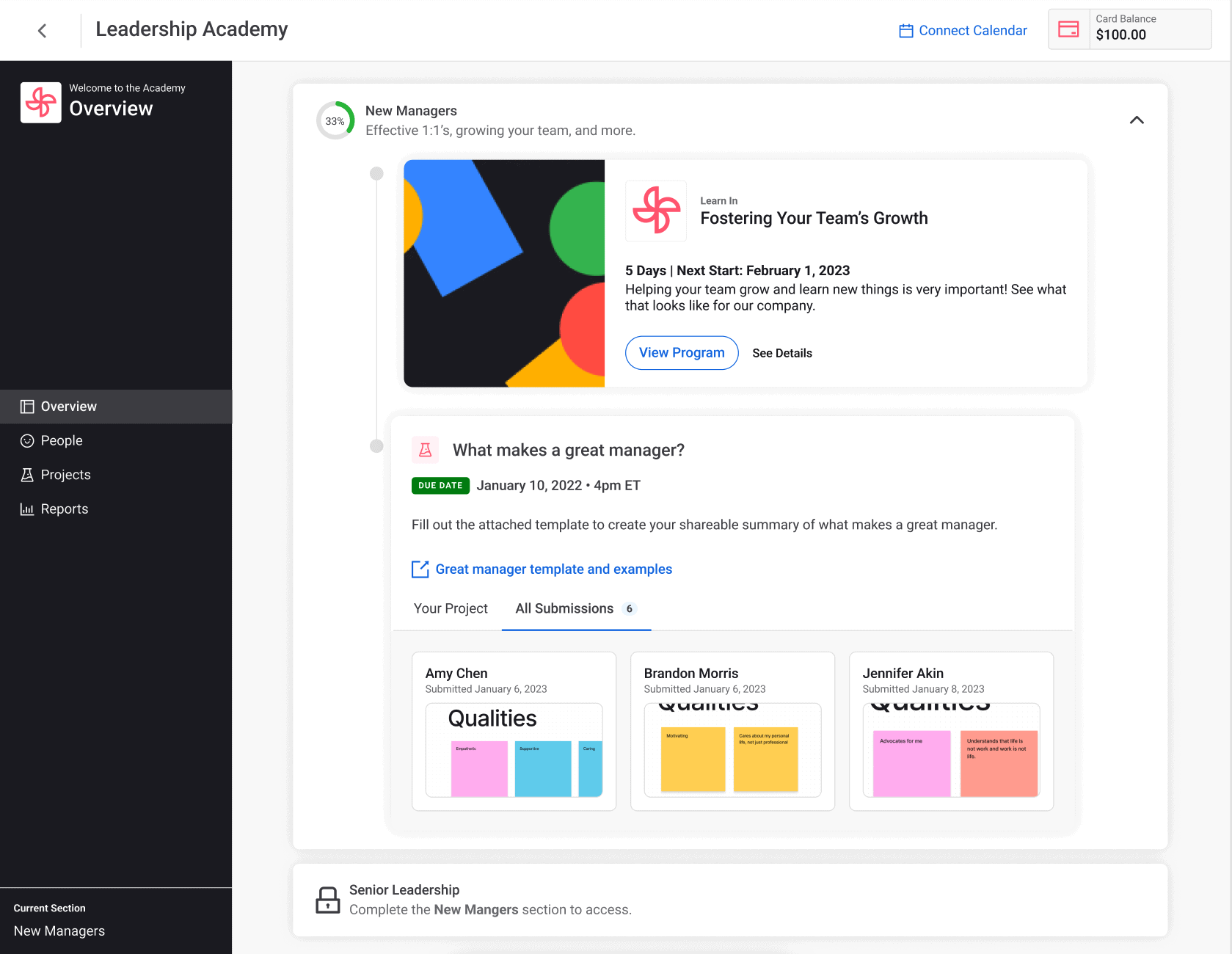 |
I could not agree with this more. Now that we have platforms like the ones in this article to buy, I know L&D buyers will budget to this area. A well-run Capability Academy for marketing professionals or HR staff may be $500k-$2 Million to build and it’s worth every penny. The ROI of “off the shelf video content” is much harder to cost-justify.
Teamraderie is a blended interactive platform designed for SME-led programs or other “activity based” events for teambuilding. Rather than position the offering as training, Teamraderie events are like “high-powered offsites” where teams come together, learn from a world expert, and do exercise and collaborative experiences on a topic. The company calls them “Experiences,” and they really work.
While Teamraderie not a “training” platform, I include it here because it solves one of the biggest problems training can address: teambuilding. These experiences are developed by world experts, and the company has designed kits and packages to deliver to remote workers. Think of it as a way to energize, connect, and celebrate your team.
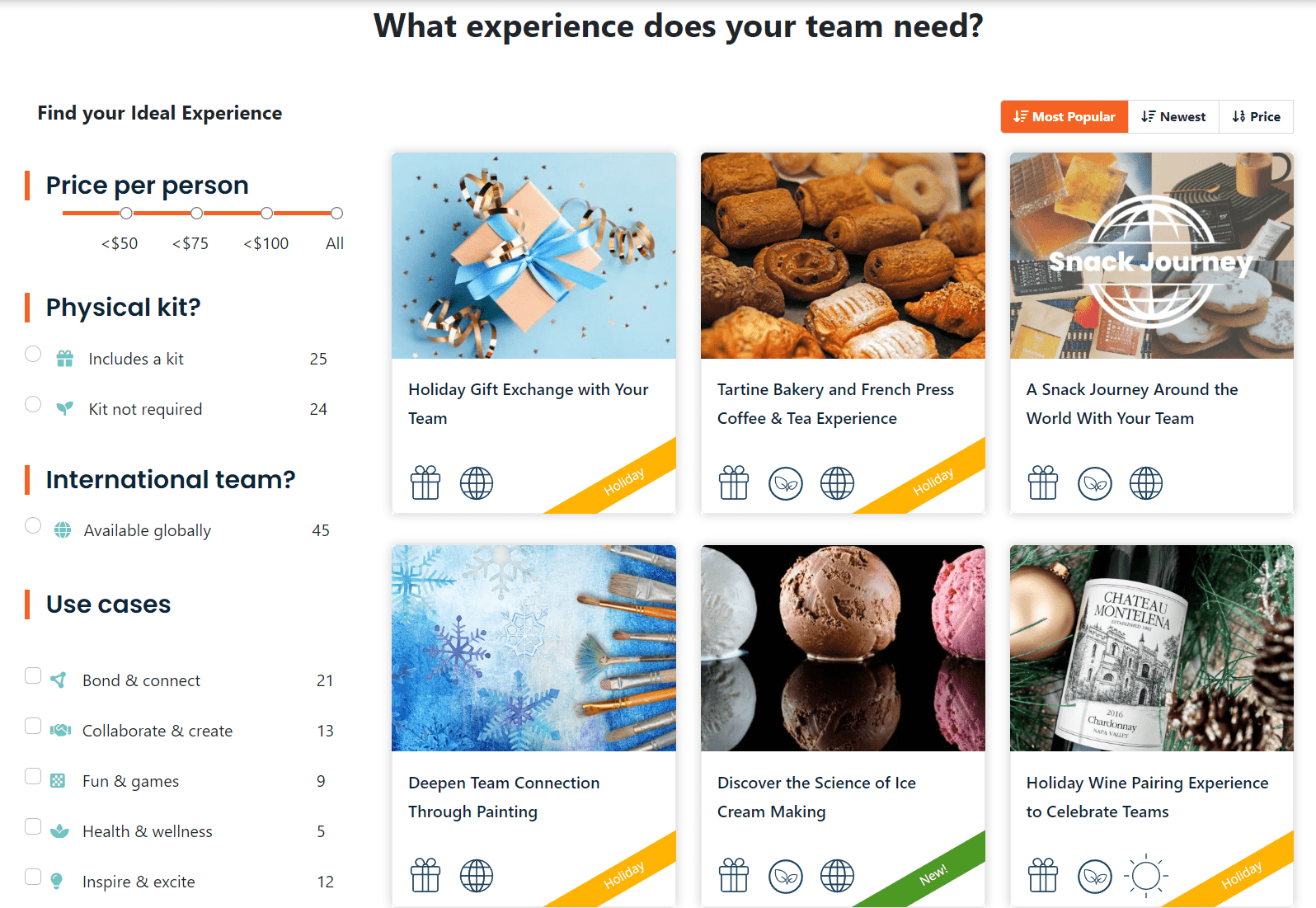 |
The company is growing quickly and has already served more than 1000 teams. You can work with them to build custom experiences for your company.
This “collaborative learning platform” is the only system I’ve seen that’s designed to let any instructor, designer, or expert build courses, administer programs, and set up end-to-end collaborative learning solutions for their users. The company is growing rapidly and is one of the most successful “next-gen” LMS and learning delivery platforms we have seen.
When I first discovered 360Learning I realized the whole idea behind this platform was different. The concept here is that “everyone is a teacher” and that any expert should be able to author a course, share content, and teach an audience what they want to teach. This idea led to a highly collaborative system, one that makes it easy to author content and very compelling for learners to learn.
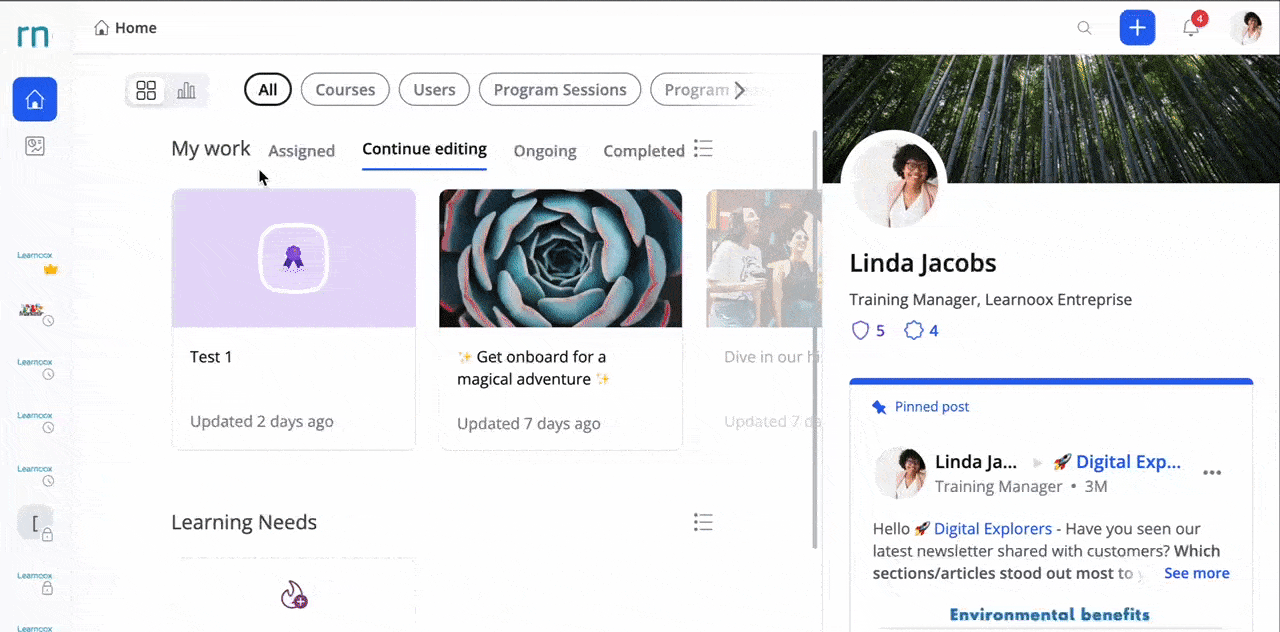 |
We interviewed many 360Learning customers and most of them were nervous about letting sales people, school teachers, IT professionals, or other SMEs author content. In every single case they told us that this platform was so easy to use that their content went viral and the quality of their learning far out performed their dreams. If you are looking at sales training, customer service, field operations, or even repair and service – 360Learning will unleash the power of your experts and change your L&D department for the better. And the company is growing like crazy.
Sana Labs brings learning, content development, LMS, capability building, and knowledge management all together. Joel Hellermark, the CEO, is a machine learning engineer and his team has built an entire platform for content development, LMS and administration, AI-enabled search, and enterprise-wide content intelligence. Yes, it all comes together and Sana is the first system I’ve seen that can truly be an end-to-end learning platform for companies.
Content developers use this unique Card format to build learning objects, assessments, videos, Q&As, and other interactivities. These can be put together into courses, certifications, and other learning experiences. And then the Sana Labs platform reaches out and indexes all your Slack, Teams, Google Drive, and other content and gives you an integrated, conversational search to find things. Yes, it works.
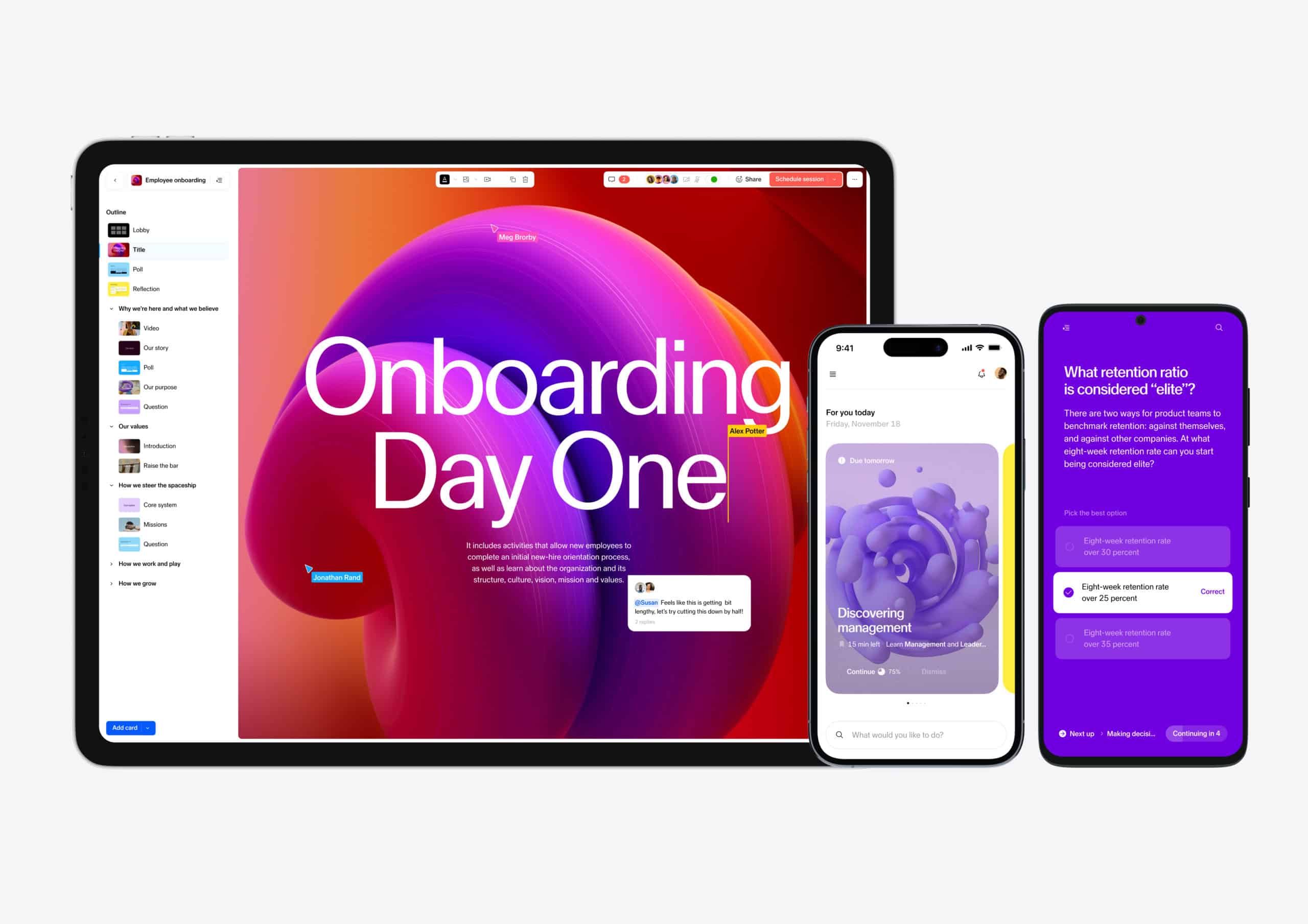 |
Imagine our Josh Bersin Academy, where a user may ask a question like “Give me an example of a company that uses OKRs?” or “How do I implement pay equity?” Of course we could point people to a course or a learning module, but what if this topic is covered in a case study or an article? Sana Labs’ platform will show you all these results and let you quickly browse and consume the answer you want. It’s pretty remarkable.
While Sana Labs is still a young company (well known in the Nordics just now coming to the US), they have a huge technology advantage over most competitors, so you have to give them a look.
Guidin: Capability Academy For Leadership
Guidin, formerly known as LaaS, is a Capability Academy platform designed for leadership development.
Initially developed as an enterprise learning platform with a focus on Employee Experience, Guildin has been designed to offer self-study, assessment, live training, and many other tools for leaders. The platform offers pulse surveys, well-being questionnaires, data, and insights for leaders, as well as the ability for team members to collaborate, communicate and share their knowledge in the form of “services”. Services are a unique take on the “creator economy” where creators can create services such as a live class/session to share their knowledge in an interactive learning session, rather than creating content that can only allow asynchronous learning.
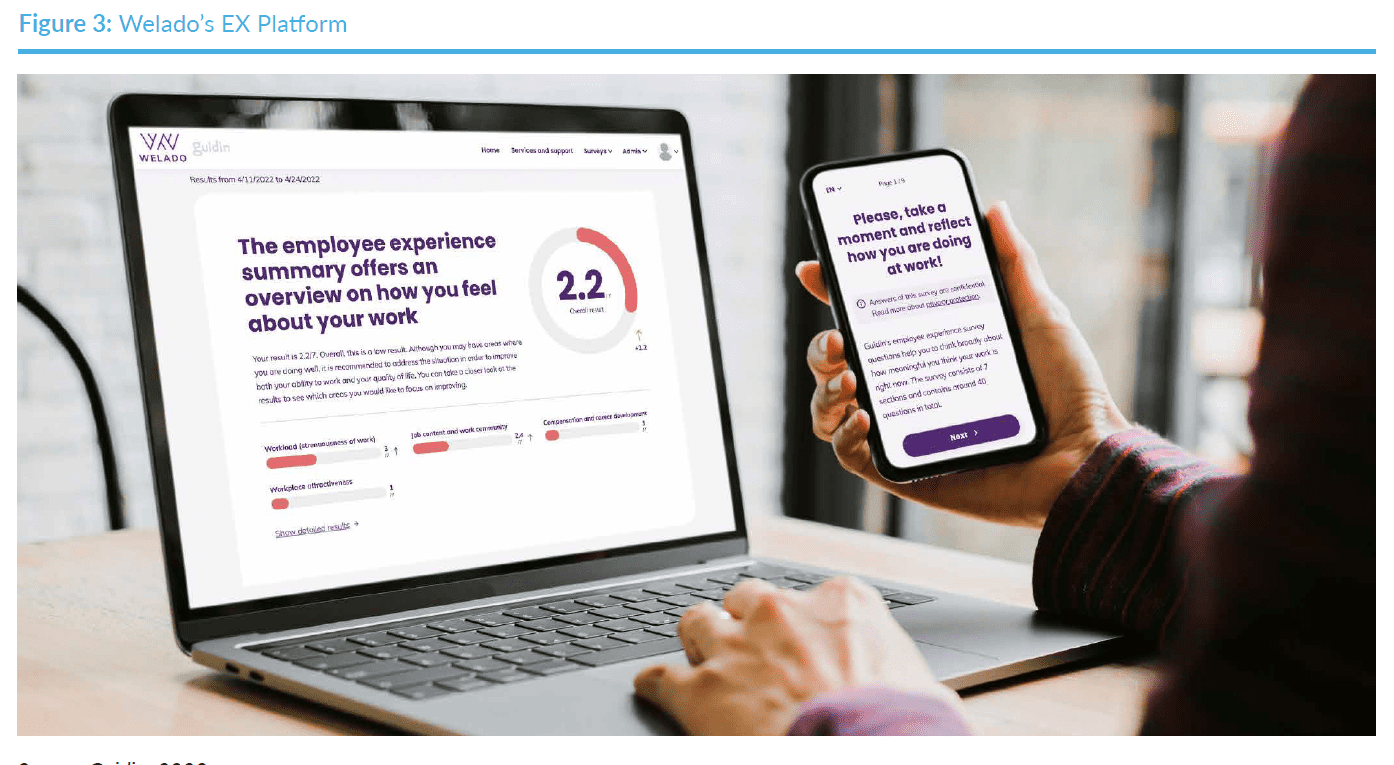 |
The company is headquartered in Finland and is now expanding throughout Europe and later the US.
Making Sense Of The L&D Technology Market
Let me summarize with a few important thoughts. First, this is a complex technology market. As the framework shows, Capability Academies (shown in purple) have to do a lot of things. They are delivery systems, collaboration systems, content systems, and assessment systems.
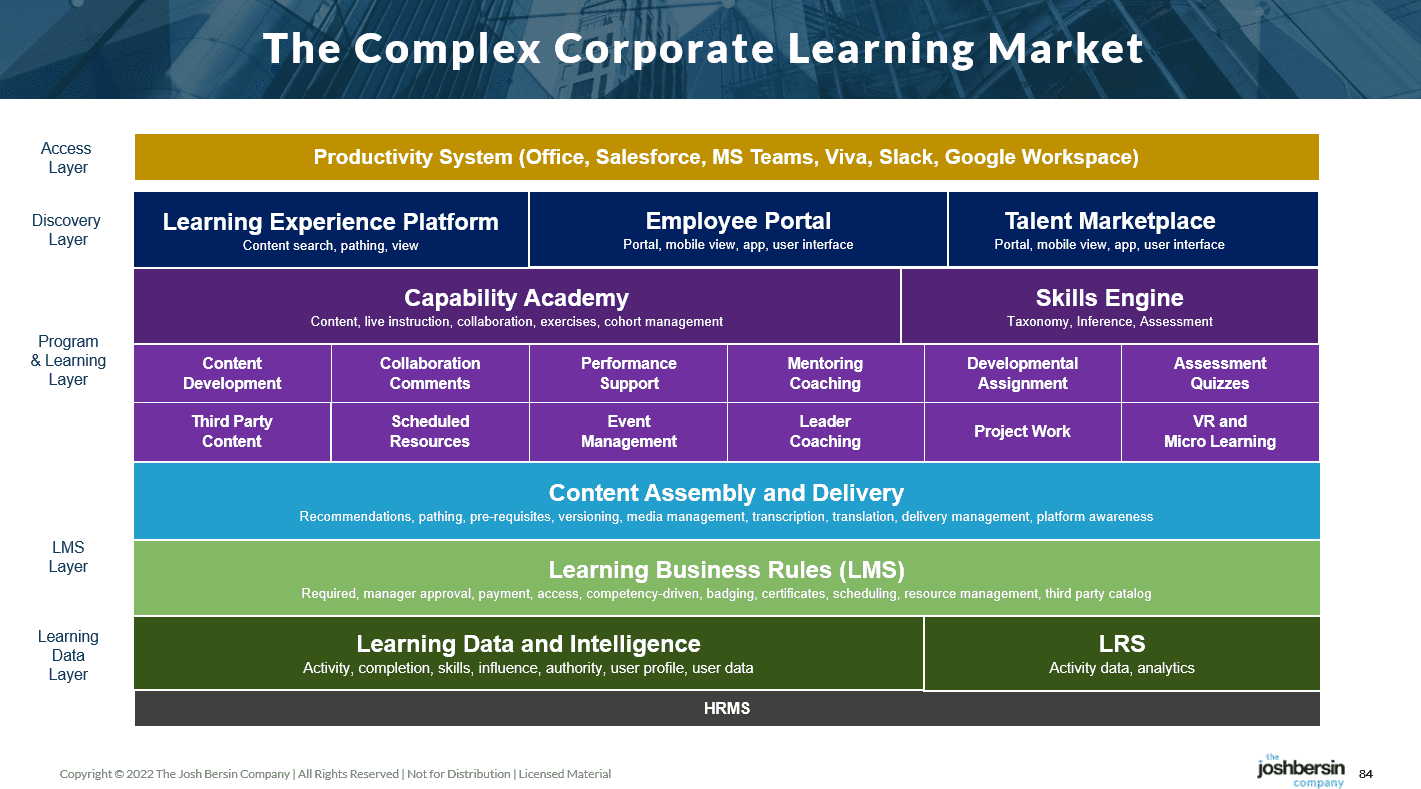 |
Second, almost every vendor plays a part. Look at most of the traditional players (SuccessFactors, Workday, Docebo, Udemy, Pluralsight, Skillsoft, LinkedIn Learning, Learning Technology Group, and many others) and each have ways to build “mastery programs.” But most are focused primarily on other parts of the stack, so they may or may not deliver on the promise.
Imagine you want to the IBM Sales Academy (I did this) or a Police Academy. In that experience you’ll have senior instructors, assignments, tests, labs, simulations, coaching, and probably some “how to” working sessions. And if you “pass” the Academy, you’ll be certified.
Why is this area of L&D so important? It’s simple: all this focus on skills is no good if we can’t deliberately and accurately “build and credentialize skills.” And that means doing a lot more than giving someone an online course, some labs, and a test.
I’ve talked with dozens of CHROs and CLOs about this for years now, and when a company builds a great Capability Academy it is often worth tens to hundreds of millions of dollars. The CEMEX Safety Academy saved lives. The Pepsi and BAT Marketing Academies changed the company’s growth trajectory. The Intel AI Academy is changing the product strategy. The Bank of America Academy transformed their consumer bank. And the Ericsson 5G Academy helps the company plan its future.
Finally let me add that a platform alone does not create an Academy. Your job is to find the right platform(s), partner with functional business leaders, and build the academies that really move the needle in your company. As I like to say about our Academy: it’s not a library of courses, it’s a “place:” a place to assess your skills, a place to learn, and a place to meet people, collaborate, test, and grow.
Additional Information
The Bank of America Academy: Mastery At Scale
The Definitive Guide To Corporate Learning: Growth In The Flow Of Work

Hello. I volunteer on the executive of the Continuous Legal Education Association of Australasia (CLEAA). Our membership comprises L&D professionals who work in law firms, law schools and Law Societies / Institutes. I wondered if you have speakers who enjoy addressing Associations like ours.? thank you, Sue-Ella
Hi Sue-Ella, yes occarsionally.. of course.